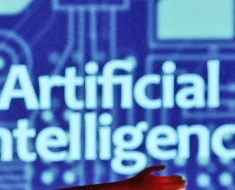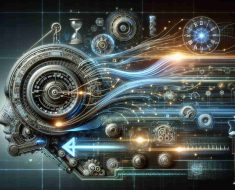Among the most disruptive technologies in the 21st century are blockchain and artificial intelligence. Together, the two technologies, through automated trust and potentially forecasting market movements, including predicting the Bitcoin price tomorrow, are transforming industries. Here, we consider some ways in which blockchain and AI have been finding their way into changing finance, healthcare and supply chain management alongside data privacy.

Introduction to Blockchain and AI
Two technologies that are breaking new ground across many sectors are blockchain and artificial intelligence. A blockchain refers to a decentralized system of ledgers, guaranteeing secure and transparent transactions since it creates an unswerving record of data shared among a computer network.
Each block contains a cryptographic hash of the previous one, and the system is tamper and fraud-proof made possible by a model of cryptography. AI, on the other hand, has as its main goal the simulation of processes of human intelligence, such as learning and reasoning, to automate the performance of tasks and increase accuracy in decision-making.
AI algorithms analyze large sets of data in identifying trends, making predictions and driving insight for accurate and efficient data-driven decisions within organizations.
Automated Trust in Finance
Finance is currently witnessing a huge transformation through integration with blockchain and AI. It securely facilitates peer-to-peer transactions without the need for intermediaries, enhancing transaction transparency and reducing costs. Storing and verifying all financial transactions through blockchain technology in a decentralized manner effectively eliminates the risk of fraud and manipulation in centralized systems.
AI algorithms analyze large volumes of financial data to detect patterns, predict market trends and personalize services for customers. In this way, they can analyze market dynamics that will help institutions make the most prudent decisions for making investments, including predicting market movements, such as the Bitcoin price for tomorrow.
This is an important forecasting feature for the markets of digital currencies because investors will want to adjust their positions concerning expected price changes. Institutions can analyze historical data to decipher market trends with an eye toward portfolio optimization and capitalizing on opportunities.
Healthcare Revolution
This blockchain-AI synergy is redefining patient care, data security and medical research in the healthcare sector. Blockchain is used to make medical records tamper-proof and confidential, guaranteeing their integrity.
Each transaction in a blockchain is encrypted and linked to the previous transactions in a way that virtually rules out any change or tampering with the medical records. It strengthens the security and privacy of the data, lessens the risks of data breaches and ensures compliance with regulations such as the Health Insurance Portability and Accountability Act.
In addition, AI algorithms analyze medical data to diagnose diseases, suggest treatments and predict outcomes. These algorithms process and interpret large volumes of medical data, which includes electronic health records, medical imaging scans and genomic data, to find patterns, discern anomalies and glean insights. With AI-driven diagnostics and predictive analytics, healthcare providers can easily offer personalized treatments for better patient outcomes and optimized health delivery.
Supply Chain Transparency
The use of blockchain and AI has been amalgamated into supply chain management to allow for more transparent, efficient and secure procedures. It allows one to trace a product from the manufacturing stage to the delivery stage, thereby reducing the risk of counterfeit products and increasing visibility in all supply chain details.
Each product has a unique digital identifier, sometimes also called a “token,” which is recorded on a blockchain and allows stakeholders to trace its source-to-destination journey. Furthermore, AI algorithms enhance the operation of supply chains to optimize demand forecasting and anomaly detection to automate the process.
AI algorithms can study historical sales, market trends and other external factors to predict demand and thus keep the inventory at optimal levels while pointing out any bottlenecks or disruptions that could develop in the supply chain. Combining the transparency of blockchain with AI’s ability to predict will hence enable organizations to improve supply chain visibility, lower cost and enhance operational efficiency.
Enhanced Data Privacy
Amid growing concerns about data privacy and security, blockchain and AI offer innovative solutions to protect sensitive information. Blockchain’s decentralized architecture ensures data integrity and prevents unauthorized access by creating tamper-proof data records. Each transaction recorded on the blockchain is cryptographically hashed and linked to previous transactions, making it virtually impossible to alter or delete data without detection.
Moreover, AI algorithms enhance cybersecurity by identifying and mitigating potential threats in real time. These algorithms can analyze network traffic, detect abnormal behavior patterns and respond to security incidents proactively, safeguarding personal data and ensuring compliance with data protection regulations. By leveraging blockchain’s tamper-proof ledger and AI’s cybersecurity capabilities, organizations can enhance data privacy, protect against cyber threats and build trust with customers and stakeholders.
Challenges and Future Outlook
The very wide adoption of both blockchain and AI indeed has huge transformative potential, though several challenges lay ahead: issues of scalability, regulatory conformance, systems interoperability and ethical concerns over data use and privacy. However, the evolution of technology would mean a brighter future as the integration of blockchain and AI further drives innovation, efficiency and growth across all industries.
These challenges might be addressed in the era of harnessing the combined capabilities of blockchain and AI and it could result in unlocking the paradigm of the next opportunity, opening the way for new digital transformations and creating value for both consumers and stakeholders.
In conclusion, this very strong synergy of blockchain with AI is reshaping industries with automated trust, transparency and efficiency. It is thus revolutionizing the future of industries, whether in finance, healthcare, supply chain management, or data privacy—the very way businesses function and relate to customers.
In one word, this is among those technologies that would enable us to have the ability to be competitive, gain sustainable growth and survive in this fast-evolving digital age.



